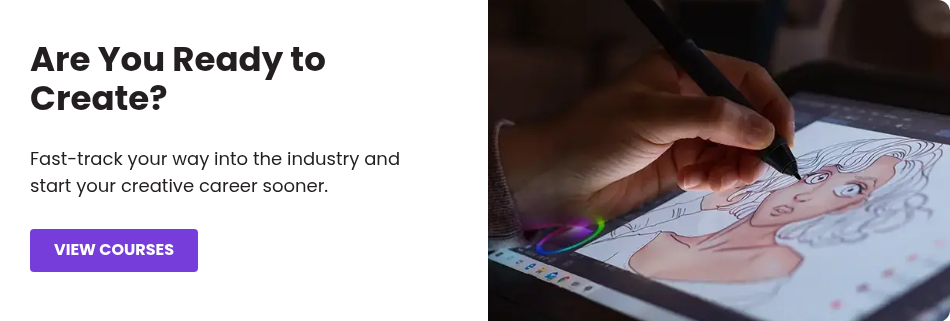The VFX and video games industries are creative, dynamic and fun. However, like any job, they still come with pressures and stresses. Whether you are just starting out or an expert in the field, working in visual effects can feel particularly demanding, especially during crunch time, which can impact your mental health.
Managing stress, depression, and anxiety
Mental health is just as important as our physical well-being. However, mental health usually manifests itself without obvious physical symptoms, so it’s easier to go unnoticed.
Common mental health triggers for people working in the film and games industry:
- Looming deadlines (both internal and external)
- Imposter syndrome
- Lack of work-life balance
- Feeling stuck on a shot, asset, or technical problem
- Contract instability
- Renewing working Visas
- Getting a foot in the door
- Working hard on a project then not making the credits
- Not receiving positive feedback about your performance
CG Spectrum’s Career Development Manager, Maxine Schnepf recognizes the significance of not looking after your mental health:
"When you're stressed, burnt out, or just not feeling your best mentally, it's difficult to stay productive. This can lead to creative blocks and make it difficult to deliver on your projects or be a reliable member of a team. That's why taking preventative measures to maintain a healthy work/life balance is so important - because addressing an issue as it's happening to you can be a lot harder."
There are some great tools available for VFX and game artists to foster and maintain good mental health. The best part? It’s a lot more straightforward than you may think!

We can all lose balance sometimes. Credit: Fleabag, Two Brothers Pictures
15 Ways to support your mental health while working in the visual effects and video game industries
1. Stay hydrated
The recommended daily intake of water is 2-3 liters, and with good reason! Every living thing requires water not just to live but to thrive — all of your body’s chemical processes take place in water. This includes the production of hormones like dopamine and serotonin, your naturally occurring ‘happy’ chemicals; and cortisol, your stress relief hormone.
A higher water intake will reduce fatigue and increase concentration, including retaining more information — like your brain has been allocated extra machines on the farm!
When stress takes full effect, hydration can be pushed down your priority list, including being overtaken by a desire for caffeinated beverages.
These strategies will have you drinking water more regularly:
- Start your workday with a full water bottle on your desk and aim to finish it by the end of the day;
- Make a habit of drinking a glass of water for every coffee or tea you consume, and with every snack or meal;
- If you find plain water unappealing, mix in some natural flavoring. Lemon, lime, mint, cucumber and even watermelon all taste great in water. Or splurge on a Soda Stream to add some bubbles!

Experiment with recipes to make water intake more interesting. Credit: blog.mercy.com
2. Dress for success
Now that many game and VFX artists are working from home, the line between work and downtime has become increasingly blurred.
Having separate clothes for work and play assists your brain in distinguishing between the two and can help you wind down after work. Psychologist Charlotte Armitage claims that by getting dressed for work, you connect the changing of clothes with a switch in mindset and focus, setting you up for a more productive workday.
Although visual effects and games generally have a relatively relaxed dress code, you still need to be presentable, especially if you’re liaising with clients.
Some simple hacks:
- Put your clothes out the night before;
- Designate a different space in your drawers/wardrobe for work clothes vs lounging around clothes;
- Ask work to put on themed dress days (everyone wears red or a hat etc.) to make getting dressed a bit more appealing and fun.
3. Sit right
Becoming engrossed in your work can often lead to you hunching over a tablet, game console, or monitor. Or you can find yourself slouching during long reviews. Because of this, your posture may suffer.
Good posture assists in alleviating some of the tension commonly held in your neck and shoulders, which may also relieve stress. It also allows more oxygen into your lungs which can help reduce fatigue and increase concentration.
Start with these posture basics:
- Ensure your monitor sits at eye level and have it sitting about an arm’s length away from your face;
- Your feet should touch the ground, and your knees should be level with your hips;
- Your wrists and hands should sit at or below elbow level;
- Avoid crossing your legs or ankles.

How to sit correctly. Credit: work-fit.com
4. Move
Being active will supply you with additional energy to sustain you through challenging periods and facilitate better sleeping habits. Exercise increases the flow of oxygenated blood around your body, boosting brain function and releasing endorphins that help regulate mood, and lower stress and anxiety levels.

Exercise and Mental Health Professor, Alex Parker shares some of her advice on staying active:
- Start by setting small, achievable goals, a process you’re more likely to repeat;
- Monitor your progress. Download a health app to encourage exercise, visually monitor your progress, and connect the dots between movement and feeling good;
- Choose an activity you enjoy doing, so that exercise is less of a chore;
- Create a routine and stick with it, even during crunch time.
You don’t need to join a gym to be active — get creative! Take the stairs instead of the lift, dance in your living room to your favorite album, vacuum vigorously, chase your dog around the backyard, or bench press your toddler!
5. Sleep on it
As a VFX or video game artist, your workdays are often spent waiting — waiting for dailies, waiting on client feedback, waiting for a license to become available, waiting on updates from upstream, and waiting for your renders on a full farm. All this waiting might make it seem like you only get to work on your shot or asset near the end of the day, commonly resulting in late nights and not enough sleep.
Sleep, like water, is essential for the upkeep of both your body and mind. You should aim for about 8 hours per night. Shut-eye converts learning into long-term memories, regulates your emotions, and boosts your immune system.
Adopt some of these pre-sleep methods for a better night’s rest:
- Adhere to a downtime period at least an hour before bed, including no (or minimal) screen time. Instead, you could read a book, knit, or take a bath — something that relaxes you and sets you up for some solid REM;
- Avoid high sugar and caffeinated treats before bedtime and get to know your cut-off time;
- Go to bed at a consistent time every night — your body knows what to expect, and waking up in the morning will become much more manageable;
- Ensure minimal distractions. Put your phone on flight mode, draw the curtains to curb external light, and minimize noise.

Sleeping Beauty Credit: Disney
6. You are what you eat
Food has a huge impact on our emotions — the term ‘hangry’ exists for a reason! When you’re working crazy-long hours, fast food can feel like the only sustenance you have time for. However, a well-balanced meal will fuel your body and brain much more effectively, and for longer, than junk food.
Bolster your concentration and mood by eating regularly and eating healthily. You’re still allowed to treat yourself, just ensure it’s along with a balanced diet. Try drinking water in between meals as it can help curb hunger pain. And if only fast food options are being offered at work, speak to your Manager or HR about adding some healthy offerings.
7. Say it out aloud
Don’t underestimate the power of releasing your emotions by putting words to them. Speaking to someone can help you feel less alone and is effective in breaking down the stigma surrounding mental health.
Your support system can be made up of people like family, friends, co-workers, a manager, mentor, or a therapist. Even if you consider yourself in a good headspace, chatting with a therapist a few times a year can help you remain in that positive place.
As part of the CG Spectrum's courses, the school's Career Development Manager, Maxine provides students with a whole lesson on mental health, including an opportunity for open dialogue.
There’s also a ‘mental health’ channel on our school’s Slack community, offering students a place to talk about what’s on their minds, share resources, and support each other.

Even Tony learned to talk through his issues! Credit: The Sopranos, HBO
8. Get to know your cycle
For people with periods, familiarizing yourself with the different phases of your menstrual cycle can illuminate why you’re feeling a certain way. Knowing the root of the cause allows you to address an issue more effectively.
Not just emotions, the menstrual cycle also affects some people’s general brain function. You may be surprised to learn this can also be in positive ways! At certain times of the month, creativity and spatial awareness increase, among other functions. Knowing your cycle better can help you use these peak times to your advantage. Check out Clue and other free apps to cultivate a better understanding of your cycle.
If your period impacts your work negatively, don’t feel ashamed to initiate a conversation with your manager. Just like mental health, talking openly about menstrual issues will reduce the stigma.
9. Break it down
When deadlines are tight, your schedule can appear overwhelming. Breaking down your VFX shots and assets into more manageable components — like a to-do list — is an effective remedy. Studies correlate breaking down tasks with reduced anxiety.
Once you have a list (or similar), start with a smaller, more achievable task. This will boost your mood and motivation by releasing dopamine, spurring you to move on and complete a slightly more challenging task.
Take lighting a complex shot as an example. Start by finding relevant references to help ascertain the lighting conditions of the plate element (live-action) like:
- grey and chrome balls
- IBLs/HDRIs
- defining your key light/sunlight and ambient light.
Shots and assets take time, and you may not see results immediately. That’s why to-do lists are great because they act as a daily record of what you’ve achieved, a nice reminder that you’re making progress. Your Production Coordinator will also love you for this and will allow them to set you a more accurate schedule with less daunting end dates.
10. Acts of kindness
It turns out, performing good deeds does result in good karma — in the form of better mental health and longer life expectancy!
Acts of kindness trigger the feel-good hormone oxytocin, which generates the release of nitric oxide into the blood vessels. Nitric oxide dilates blood vessels, reducing blood pressure and lowering your risk of many health conditions and stress.
Acts of kindness range from smiling at a passing stranger to donating to your favorite charity. In the workplace, you could assist a fellow VFX artist with something they’re troubleshooting or simply let them know when you think they’ve done an outstanding job. Don’t forget to be kind to yourself too!
11. Social time
We are inherently social creatures, and human connection is vital in maintaining our mental health. Social settings also provide opportunities to talk about how you’re feeling (see Say it Out Aloud above).
Make time for friends, even if it’s just a cup of tea in the break room or getting to a review a few minutes early to chat with your teammates.
And remember, social time means taking a break from work, a requisite in maintaining your mental health.

Stay social. Credit: Friends, NBC
12. Find passions outside of work
Whether you work to live or live to work in the VFX and games industry, it’s important to create room for other pastimes and hobbies.
CG Spectrum mentor, William Faucher uses his hobby of photography to help with his mental health, but he believes it has other benefits too, "I bought my first DSLR back in 2011, and it was one of those hobbies that saved my mental health and fought off depression and loneliness with shocking efficacy. Photography helps you learn so much about lighting, composition, editing, color, all the things that can be applied to 3D, filmmaking, and just about anything artistic."
Engaging with outside interests provides you with more opportunities to switch off from career worries and other workplace concerns.
Furthermore, Kevin Eschleman, a psychology professor at San Francisco State University, maintains that pursuing hobbies and interests outside work benefits mental health, focus, and stress levels. These outcomes often result in us tackling our workplace challenges more effectively too.
13. Routine
A new routine is a bit like a software update. It often takes a while to get used to (and you may need to squash a few bugs!), but in the end you’ll be better off. It will reduce your mental fatigue by knowing what to expect next, and alleviate anxiety over the unknown. A routine also ensures you schedule in breaks.
According to studies, a new habit or regimen takes 21 days to stick, so make sure you apply yourself for those first few weeks. Creating healthy practices around your sleep, exercise, and eating habits is great. You can also incorporate more mental-health-focused activities like mindfulness into your routine.
14. Practice mindfulness
Mindfulness pulls focus on the present and is commonly used to treat depression, anxiety, and even chronic pain. Through practices like yoga and meditation mindfulness is linked to increased creativity, concentration, and memory.
If meditation isn’t your thing, there are other options:
- Stretch. This fifteen-minute full-body stretch video is a great way to calm your mind and wind down;
- The daily gratitude exercise is also beneficial — simply list three things for which you are grateful. Do it while you brush your teeth or in the shower, so it slots easily into your daily routine;
- Journaling is also known to support mental restoration and wellness.

Don Draper chills out. Credit: Madmen, AMC
15. Take a mental health day
When Maya crashes, and that pop-up window replicates itself like tightly stacked dominoes as you drag it around your computer screen, it often requires a restart. Sometimes our brains will function better with a restart too.
Just like we need sick days, a mental health day can provide us with an opportunity to reset. Make sure your managers know what’s going on, so they’re able to support you and find someone to cover your work, if required (which also assists in reducing everyone’s stress levels).
Next steps
If you’re unable to shake that dark cloud, consider seeking out the guidance of your counselor, therapist, or psychologist. If you don’t have a therapist yet, pop into your local GP and they’ll be able to refer you to someone.
Careers in VFXor gaming can be high-pressure, but with the right strategies, they can be highly rewarding without the stress. Aside from teaching students the technical skills to pursue their dream careers in the film and game industry, CG Spectrum offers additional resources and strategies to support mental health. This includes regular online meetups giving students a place to support each other. Mentors also offer their insights into studio life, and tips for navigating work-life balance. If your calling is in the visual arts of gaming and entertainment, get the support and training you need at CG Spectrum!

Related Links




